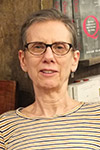Downtown Arts Series author invents ways to use language in writing
For Barbara Henning, the process of writing almost always starts with her daily journal entries.
The author, poet and professor emeritus at Long Island University writes in her journal every day, and those entries often become part of her published works.
“It’s become a way of life for me, much like yoga,” Henning said. “I like to learn through my writing. The experience gives me different points of view so I can see the world differently and share my insights with others.”
Henning is the next speaker in the University of Houston-Victoria Downtown Arts Series. She will give a reading of some of her work and talk about her writing process at 7 p.m. Oct. 15 in the UHV Center for the Arts, 204 N. Main St. A question-and-answer session will follow. The event is free and open to the public.
“Barbara Henning is the clearest writer I know,” said Charles Alexander, UHV poet and designer in residence, and co-curator of the series. “While clarity is an important characteristic in all writing, it is seldom achieved. In Henning’s work, the quality of clarity is so well achieved that we are stunned, as though seeing sunlight for the first time. Henning’s work never fails to move me, to touch me at the very core of being.”
Henning’s journaling became an integral part of her most recent publication, “A Day Like Today.” The poetry collection began as her daily effort to write a full page about the events of that day. Once she completed the entries, she chose words from each page and researched them in the New York Times archive. She then collaged phrases from that research into each poem.
“When I first wrote ‘A Day Like Today,’ I felt that the poems needed to include a more global perspective,” Henning said. “I ended up inventing a way to bring that in.”
“You, Me and the Insects” is a novel that also came from her journaling. While traveling in India, Henning wrote about her trip in a journal. Afterward, that 50-page journal became the basis for a 300-page novel.
Henning’s decision to become a writer began with a love of reading. Her mother used to take her to the public library and encouraged her to read. When her mother died, Henning held on to that love and the memories of those library trips. Writing poetry became a natural progression from that, she said.
One of her inventive pieces, “14x14x14,” began as an exercise to help her friend and fellow poet Martine Bellen get past a momentary writer’s block. They used index cards that had 14 lines on them. They each wrote a line every hour for 14 hours a day over 14 days, ending with 14 sonnets. The resulting poems were edited and published in a book by Bellen and Henning.
“I tend to use various approaches for each project,” Henning said. “Most of my poetry is accessible, but it has edges and disjunctions. I hope when I read to people in Victoria that they will leave wanting to read more of my prose and poetry.”
The UHV Downtown Arts Series presents an array of groundbreaking arts practices to the Victoria community and stimulates dialogue about the arts as a presence in people’s lives.
“Barbara Henning’s work is of the highest order, whether in fiction, poetry or creative nonfiction,” Alexander said. “She should appeal to all of our undergraduate and graduate creative writing students, as well as to a wide community of readers.”
For more information about the event or series, contact Alexander at 361-703-5147 or alexanderch@uhv.edu.
The University of Houston-Victoria, located in the heart of the Coastal Bend region since 1973 in Victoria, Texas, offers courses leading to more than 80 academic programs in the schools of Arts & Sciences; Business Administration; and Education, Health Professions & Human Development. UHV provides face-to-face classes at its Victoria campus, as well as an instructional site in Katy, Texas, and online classes that students can take from anywhere. UHV supports the American Association of State Colleges and Universities Opportunities for All initiative to increase awareness about state colleges and universities and the important role they have in providing a high-quality and accessible education to an increasingly diverse student population, as well as contributing to regional and state economic development.
Lauren Hightower-Emerson
361-570-4342








